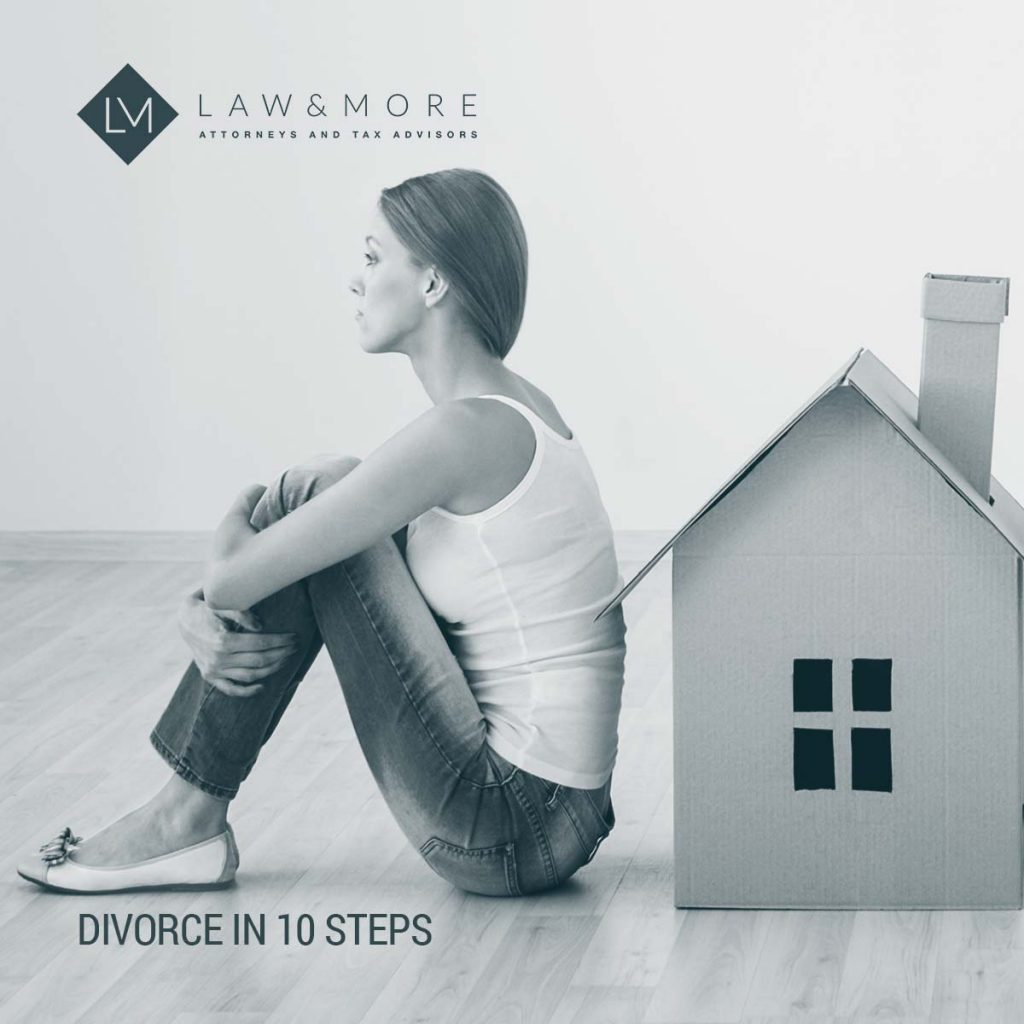Your Guide to Divorce in 10 Steps
It is difficult to decide whether to get a divorce. Once you have decided that this is the only solution, the process really begins. A lot of things need to be arranged and it will also be an emotionally difficult period. To help you on your way, we will give an overview of all the steps you have to take during a divorce.

Step 1: Notification of divorce
It is important that you first tell your partner that you want a divorce. This notification is often also called the divorce notification. It is wise to give this notice to your partner personally. How difficult it may be, it is good to talk about it with each other. This way you can explain why you have come to this decision. Try not to blame each other. It is and remains a difficult decision for both of you. It is important that you try to maintain good communication. Furthermore, it is good to avoid tensions. In this way, you can prevent your divorce from becoming a fight divorce.
If you can communicate well with each other, you can also divorce together. It is important that you hire a lawyer to guide you through this period. If the communication with your partner is good, you can use one lawyer together. If this is not the case, each party will have to hire its own lawyer.
Step 2: Calling in a lawyer/mediator
A divorce is pronounced by the judge and only lawyers can file a petition for divorce with the court. Whether you should choose a lawyer or a mediator depends on the way you want to divorce. In mediation, you choose to be accompanied by one lawyer/mediator. If you and your partner each use your own lawyer, you will be on opposite sides of the proceedings. In that case, the proceedings will also take longer and incur more costs.
Step 3: Important data and documents
For a divorce, a number of personal details about you, your partner and children are important. For example, a marriage certificate, birth certificates of the children, BRP extracts from the municipality, extracts from the legal custody register and any prenuptial agreements. These are the most important personal details and documents needed to start divorce proceedings. If in your specific situation more documents or information are needed, your lawyer will inform you.
Step 4: Assets and debts
It is important that you map out all assets and debts of you and your partner during the divorce and collect the supporting documents. For example, you can think of the title deed of your house and the notarial mortgage deed. The following financial documents can also be important: capital insurance policies, annuity policies, investments, bank statements (from savings and bank accounts) and income tax returns from recent years. Furthermore, a list of household effects should be drawn up in which you indicate who will receive what.
Step 5: Child support/Partner support
Depending on your financial situation, child or spousal support will probably have to be paid as well. In order to determine this, the income data and fixed expenses of both parties need to be reviewed. Based on these data, your lawyer/mediator can make an alimony calculation.
Step 6: Pension
A divorce can also have consequences for your pension. To be able to determine that, documents are required showing all pension entitlements accrued by you and your partner. Subsequently, you and your (ex) partner can make arrangements concerning the division of the pension. For example, you can choose between the statutory equalisation or the conversion method. Your pension fund could help you make the right choice.
Step 7: Parenting plan
If you and your (ex) partner also have children, you are obliged to draw up a parenting plan together. This parenting plan is submitted to the court together with the divorce request. In this plan you will lay down agreements together about:
- The way you divide the care and parenting tasks;
- the way you inform and consult each other about important events for the children and about the assets of the minor children;
- the costs of the care and upbringing of the minor children.
It is important that the children are also involved in drawing up the parenting plan. Your lawyer can possibly draw up a parenting plan for you together with you. That way you can be sure that the parenting plan meets all the requirements of the court.
Step 8: Filing the petition
When all agreements have been made, your joint lawyer or your partner’s lawyer will prepare a petition for divorce and file it with the court. In a unilateral divorce, the other party will be given a period of time to put forward their case and then a court hearing will be scheduled. If you have opted for a joint divorce, your lawyer will file the petition and, in most cases, a court session will not be necessary.
Step 9: Oral proceedings
During oral proceedings, the parties must appear together with their lawyer. During the oral hearing, the parties are given the opportunity to tell their story. The judge will also have the opportunity to ask questions. If the judge is of the opinion that he has enough information, he will end the hearing and indicate within which term he will rule.
Step 10: The divorce decision
Once the judge has pronounced the divorce decision, you can appeal within 3 months of the decree if you disagree with the decision. After three months the decision becomes irrevocable and the divorce can be registered in the civil registry. Only then is the divorce final. If you do not wish to wait for the three-month period, you and your partner can sign a deed of acquiescence that your lawyer will draw up. This document indicates that you agree with the divorce decision and that you will not appeal. You then do not have to wait for the three-month period and can immediately register the divorce decree in the Civil Registry.
Do you need help with your divorce or do you have any questions about the divorce proceedings? Then contact the specialized family law lawyers at Law & More. At Law & More, we understand that the divorce and the subsequent events can have a major impact on your life. That is why we take a personal approach. Our lawyers can also assist you in any proceedings. The lawyers at Law & More are experts in the field of personal and family law and will be happy to guide you, possibly together with your partner, through the divorce process.
